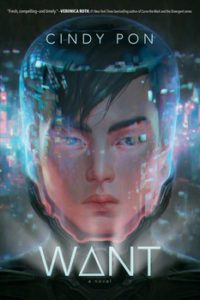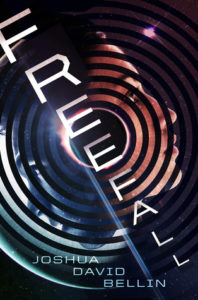Despite the supposedly ground-breaking nature of literary fiction, genre fiction – mysteries, thrillers, and science fiction – have often become the place where hard-hitting themes of social injustice and environmental degradation find their strongest expression. While race relations and police violence have appeared in contemporary YA novels such as Angie Thomas’s The Hate U Give, very few address the consequences of global warming and economic inequality with the outspokenness of two recent works of science fiction for teens, Cindy Pon’s Want and Joshua David Bellin’s Freefall.
 Want takes place in Taipei, Taiwan – where Pon was born – in a future in which private vehicles fly above the city and the wealthy you (the “haves”) are insulated from the hunger and sickness that the impoverished mei (the “wants”) suffer. The lifespan of the mei is half that of the you because of air and water pollution and the inability to afford protective clothing manufactured and sold by Jin Corp. And now, Jin Corp has released a deadly virus to create a need for new suits.
Want takes place in Taipei, Taiwan – where Pon was born – in a future in which private vehicles fly above the city and the wealthy you (the “haves”) are insulated from the hunger and sickness that the impoverished mei (the “wants”) suffer. The lifespan of the mei is half that of the you because of air and water pollution and the inability to afford protective clothing manufactured and sold by Jin Corp. And now, Jin Corp has released a deadly virus to create a need for new suits.
Although educated in California, Jason Zhou is a mei, cast out by his well-to-do family because of his now-deceased mother’s life choices. Since then, he has become part of a rebel group seeking to destroy Jin Corp and kidnapping careless yous to finance their operations. One of his first kidnappings nets Daiyu, who turns out to be the daughter of Jin Corp’s CEO; months later, he is ordered to befriend her to infiltrate the corporation’s headquarters. He fears she remembers him despite his drugging her during the kidnapping; worse yet, he is falling in love with her, and she with him.
Pon extrapolates present-day Taipei to a vividly realized dystopian future. Because humanities education has been abolished as useless or subversive, an abandoned university tucked into the mountains overlooking the city becomes a hideaway for members of an insurgency against the corporate-run dictatorship. The destruction of the environment becomes one more opportunity for profit. Jason Zhou is a kind of everyman hero – a street kid trying to survive who must put on the persona of a callous and privileged you to bring down a monolithic evil.
 Like Want, Freefall is a page-turner, but one with even more high-tech embellishments. The story begins in the year 2150, when leaders of the global North, the Upperworld, are preparing to send a million of their best and brightest to a planet in a different solar system that will sustain life. Earth is ruined, half flooded, unable to support its population, and torn by war and “Terrarism.” The “Terrarists” are, for the most part, members of the global South, the Lowerworld – people with darker skin and a variety of religious traditions (the Upperworld seems to have given up religion altogether). Bellin’s 17-year-old protagonist, Cam Newell, is one of the select along with his two best friends, Adrian and Griff. But watching a bootleg feed, Cam sees and becomes infatuated with a young Lowerworld leader, Sofie Patel, and seeks her out. He falls in love with her and for a while defects to the Lowerworld with her until she mysteriously dumps him.
Like Want, Freefall is a page-turner, but one with even more high-tech embellishments. The story begins in the year 2150, when leaders of the global North, the Upperworld, are preparing to send a million of their best and brightest to a planet in a different solar system that will sustain life. Earth is ruined, half flooded, unable to support its population, and torn by war and “Terrarism.” The “Terrarists” are, for the most part, members of the global South, the Lowerworld – people with darker skin and a variety of religious traditions (the Upperworld seems to have given up religion altogether). Bellin’s 17-year-old protagonist, Cam Newell, is one of the select along with his two best friends, Adrian and Griff. But watching a bootleg feed, Cam sees and becomes infatuated with a young Lowerworld leader, Sofie Patel, and seeks her out. He falls in love with her and for a while defects to the Lowerworld with her until she mysteriously dumps him.
These chapters from the twenty-second century alternate with ones from the year 3151, when, after waking from deepsleep, Cam and the other travelers find their ship, as well as the Lowerworld ship (a former supply ship added at the last minute in order to quell a rebellion), on the wrong planet. Theirs is a hostile planet full of deadly creatures, half-human and half-machine. Cam must try to figure out what went wrong, fight deadly creatures as well as enemies on both sides, and find and save Sofie, who has been kidnapped from the Lowerworld ship and is now in the hands of Adrian’s father, the Upperworld commander.
While the destruction of the environment is a reason for the thousand-year voyage, Bellin’s principal theme is that of racism and inequality. Decades of ethnic cleansing via forced removal and genocide have generated an Upperworld society in which large corporations (“corponations”) control an infantilized, poorly educated population ripe for manipulation by criminals within. The Lowerworld people lack the resources to improve their lives, and have cast their lot with a dynasty of charismatic female leaders of which Sofie, despite her mysterious provenance, is the latest descendant. Ultimately, the social divisions and animosities benefit no one, and while Cam is basically an innocent, a pawn in a geopolitical scheme he doesn’t understand, he also represents humankind’s only hope. For fans of science fiction and high-tech dystopias, Freefall’s nonstop thrills, spills, and surprises will hold appeal while suggesting parallels with the present day.